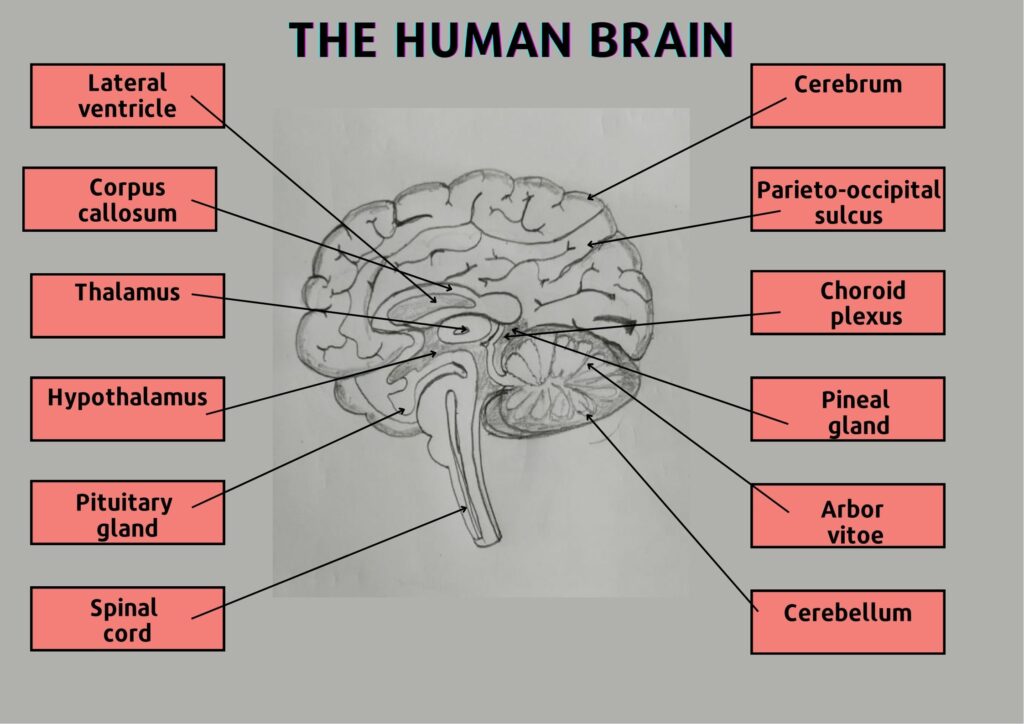The Human Brain: A Complex and Mysterious Universe
The human brain is a complex and captivating organ, capable of astonishing cognitive, creative, and innovative feats. It serves as the body’s control center, tasked with processing information, regulating movement, and enabling thought, emotion, and behavior. Even with its significance, the brain is an enigmatic universe, teeming with uncharted areas and unresolved inquiries.
Table of Contents
Brain Structure and Function

the human brain is Made up of billions of neurons—specialized cells that send electrical and chemical signals to one another—the brain is a complex organ. The neurons are arranged into various regions, each serving unique functions and duties. The principal areas of the brain comprise:
- Cerebrum: The brain’s largest component, which handles sensory data processing, movement control, and the management of thought and emotion.
- Cerebellum: The cerebellum, positioned at the lower part of the brain, is responsible for coordinating movement and balance.
- Brainstem: The brainstem links the cerebrum with the spinal cord and manages fundamental processes such as heart rate and respiration.
The human Brain’s Information Processing Mechanism
the brain is a complex network of neurons and synapses enables to process information. Our senses dispatch signals to the brain as we perceive our surroundings, and the brain interprets and processes this data. It engages various brain areas, such as the sensory cortices, association regions, and advanced processing centers.
The Strength of Neuroplasticity
The human brain’s capacity for lifelong adaptation and change is among its most extraordinary characteristics. This is referred to as neuroplasticity, which enables the brain to reorganize itself based on new experiences, learning, and environmental changes. Neuroplasticity is crucial for learning and memory, as well as for recovering from brain injuries.
Brain Function and Behavior
The human brain plays a critical role in shaping our behavior, emotions, and thoughts. Different brain regions are involved in different aspects of behavior, including:
– Emotional Regulation: The amygdala and prefrontal cortex play key roles in regulating emotional responses.
– Decision-Making: The prefrontal cortex is involved in decision-making, planning, and problem-solving.
– Social Behavior: The brain’s social cognition network, including regions like the mirror neuron system, enables us to understand and interact with others.
The Impact of Lifestyle on Brain Health
Our choices regarding lifestyle can greatly affect the health of our brains. Aspects such as nutrition, physical activity, rest, and tension can affect cognitive performance and general health. Maintaining a healthy lifestyle—characterized by sufficient sleep, regular physical activity, and a nutritious diet—can bolster brain health and lower the likelihood of cognitive decline.
The Importance of Brain Health
It is vital for general wellness to keep the brain healthy. With aging, the brain experiences natural changes that can influence cognitive function. Nonetheless, brain health can also be influenced by lifestyle choices and particular medical issues. We can lower the likelihood of cognitive decline and uphold our independence and quality of life by placing a priority on brain health.
Current Research and Future Directions
Studies on the brain continue, with researchers delving into novel areas of neuroscience and creating cutting-edge therapies for brain disorders. Current research encompasses several areas, including:
- Brain-Computer Interfaces: Developing technologies that enable people to control devices with their thoughts.
- Neurostimulation: Using techniques like transcranial magnetic stimulation (TMS) and transcranial direct current stimulation (tDCS) to modulate brain activity.
- Gene Editing: Exploring the potential of gene editing technologies like CRISPR to treat brain-related disorders.
Brain Disorders and Diseases
There are many brain disorders and diseases that can impact brain function and overall health. Some examples include:
- Alzheimer’s disease :A degenerative brain condition that impacts memory and cognitive abilities.
- Parkinson’s disease: A disorder characterized by degeneration of the nervous system, affecting movement and motor control.
- Depression: A mood disorder that may affect cognitive function and general health.
The Future of Brain Research
The future of brain research holds much promise, with scientists working to develop new treatments and therapies for brain-related disorders. Some areas of future research include:
– Individualized medicine: Creating customized therapies for specific brain diseases and disorders.
– Therapies using stem cells: Investigating the capability of stem cells to mend or substitute damaged brain tissue.
– Artificial Intelligence: Creating AI solutions that can emulate brain activity and enhance our comprehension of the brain.
Conclusion
The human brain represents a complex and enigmatic universe, teeming with uncharted territories and unresolved inquiries. We can unveil the mysteries of the brain and enhance our general well-being by comprehending its structure, function, and behavior. We can strive for a brighter future for brain health and realize the human brain’s full potential by placing priority on brain health and backing research and innovation.
Additional Resources
If you’re interested in learning more about the brain and brain health, here are some additional resources:
– National Institute of Mental Health (NIMH): A leading organization for research and education on mental health and brain disorders.
– The Brain & Behavior Research Foundation: A non-profit organization dedicated to supporting research on brain and behavior disorders.


